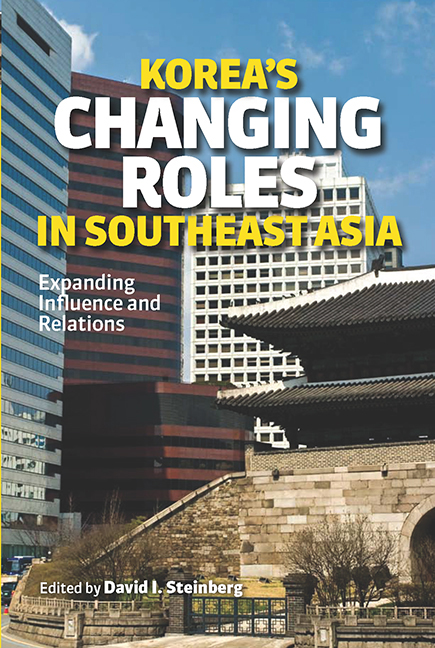Book contents
- Frontmatter
- Contents
- List of Tables, Figures and Photos
- Foreword
- Message
- Acknowledgements
- The Contributors
- 1 Tenuous Beginnings, Vigorous Developments
- 2 Perspectives on Korea's Role in ASEAN
- 3 South Korea and Southeast Asia: Ideas for Deepening the Partnership
- 4 Divergence Amidst Convergence: Assessing Southeast and Northeast Asian Security Dynamics
- 5 Korea's Economic Relations with Southeast Asia
- 6 Investment of Korean Electronics Industry in Southeast Asia
- 7 Korean Assistance to Southeast Asia
- 8 Korean Development Model: Lessons for Southeast Asia
- 9 Southeast Asian Migrant Workers in South Korea
- 10 Filipina Wives and “Multicultural” Families in Korea
- 11 A Fading Wave, Sinking Tide? A Southeast Asian Perspective on the Korean Wave
- 12 The Korean Wave: Korea's Soft Power in Southeast Asia
- 13 The Republic of Korea in Southeast Asia: Expanding Influences and Relations
- 14 Korea's Preparation for Southeast Asia: Research and Education on Southeast Asian Studies in Korea
- 15 Conclusion
- Index
1 - Tenuous Beginnings, Vigorous Developments
Published online by Cambridge University Press: 21 October 2015
- Frontmatter
- Contents
- List of Tables, Figures and Photos
- Foreword
- Message
- Acknowledgements
- The Contributors
- 1 Tenuous Beginnings, Vigorous Developments
- 2 Perspectives on Korea's Role in ASEAN
- 3 South Korea and Southeast Asia: Ideas for Deepening the Partnership
- 4 Divergence Amidst Convergence: Assessing Southeast and Northeast Asian Security Dynamics
- 5 Korea's Economic Relations with Southeast Asia
- 6 Investment of Korean Electronics Industry in Southeast Asia
- 7 Korean Assistance to Southeast Asia
- 8 Korean Development Model: Lessons for Southeast Asia
- 9 Southeast Asian Migrant Workers in South Korea
- 10 Filipina Wives and “Multicultural” Families in Korea
- 11 A Fading Wave, Sinking Tide? A Southeast Asian Perspective on the Korean Wave
- 12 The Korean Wave: Korea's Soft Power in Southeast Asia
- 13 The Republic of Korea in Southeast Asia: Expanding Influences and Relations
- 14 Korea's Preparation for Southeast Asia: Research and Education on Southeast Asian Studies in Korea
- 15 Conclusion
- Index
Summary
Background
Korea's entry onto the world stage has not come trippingly; it started as a crawl but has turned into a sprint. Forgotten by most of the modern world because of Japanese expansionist policies in the early twentieth century and that country's almost exclusive monopoly on scholarship on Korea during the same period, Korea was even ignored by the Allies in strategic considerations during World War II. The plans for stripping Japan of its Korean colony and for eventual Korean independence were poorly conceived at the November 1943 meeting of the United States, Great Britain, and China in Cairo. These plans determined that “in due course Korea shall become free and independent”, but were badly executed. The three-year American military occupation (1945–48) of the southern portion of the peninsula, juxtaposed with the Soviet occupation of the north, became one of the first Cold War confrontations, both externally with the North and internally with southern, leftist, popular organizations.
Even the Korean War (1950–53), instigated by the North with the tacit approval and eventual support of the Sino-Soviet Bloc, as it was then called, has been known as the “Forgotten War”, yet this war was one in which the Philippines and Thailand each supplied a battalion to augment the defences of the United States and South Korea under United Nations auspices. Plagued by authoritarian rulers for a generation, subject to internal revolution in 1960, a military coup in 1961, and innumerable anti-government demonstrations in the interim and thereafter, Korea was not the poster child of the “free world”, as Western governments, principally the United States, liked publicly to proclaim.
If Korea's entry into, and its first generation of, modern independence were inauspicious, it has since performed in stellar fashion advancing from one of the world's poorest countries to become the eleventh largest economy on the planet; raising the income of its people from a few dozen dollars per capita to over $20,000; and earning worldwide acceptance and respect for Korean brand names in medium and higher technological products. Korea lacked natural resources, had insufficient arable land, was overpopulated, had little infrastructure beyond what had been destroyed in the Korean War, and operated under a deplorable political system.
- Type
- Chapter
- Information
- Korea's Changing Roles in Southeast AsiaExpanding Influence and Relations, pp. 1 - 23Publisher: ISEAS–Yusof Ishak InstitutePrint publication year: 2010



